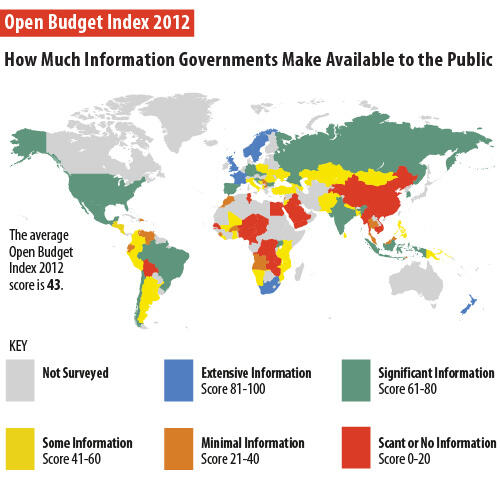off the charts
POLICY INSIGHT
BEYOND THE NUMBERS
BEYOND THE NUMBERS
77 of 100 Countries Shut Citizens Out of Critical Budget Decisions
Receive the latest news and reports from the Center
More than three-quarters of 100 countries surveyed — home to half the world’s people — do not meet basic standards of budget transparency, according to the International Budget Partnership (IBP), an organization formed within the Center on Budget and Policy Priorities that works with civil society to improve governance and budget systems and reduce poverty worldwide.
IBP yesterday released the Open Budget Survey 2012, the only independent, comparative, and regular measure of budget transparency and accountability around the world. The Survey also found that many governments do not provide sufficient opportunities for citizens and civil society to engage in budget processes.

While the current picture is bleak, budget transparency has improved steadily over the four rounds of the Survey since 2006, and such countries as Honduras, Afghanistan, and Mozambique have made major improvements. These examples show that the commitment of governments — combined with donor interventions, international standards, and civil society pressure — can significantly and rapidly improve budget transparency.
Still, progress has not been as sufficient or as rapid as possible, or as necessary. At the current rate of improvement, it could take decades for all countries to reach a reasonable level of budget transparency. This could mean a generation of wasted resources and missed opportunities.
The Survey’s findings show that quick improvement is possible. For instance, one in six of the budget documents that governments should be publishing are already produced for internal use but withheld from the public. Countries could significantly improve their budget transparency, at little or no cost, merely by posting these documents on their existing websites.
Even with the dearth of governments providing substantial opportunities for public participation, the Survey identified examples of governments taking innovative and meaningful steps to engage citizens in budget decisions and oversight. These include hotlines for reporting problems with service delivery, public hearings to gather input on proposed budget policies, and efforts to bring communities into audits of public programs. In short, executives, legislatures, and supreme audit institutions all over the world can draw from excellent models.
Good budget practices have been identified and standards have been set. Substantial technical assistance is available. The framework to improve exists. All that’s typically missing, in individual governments, is the political will to act.
Click here to explore the full set of Open Budget Survey data and findings.